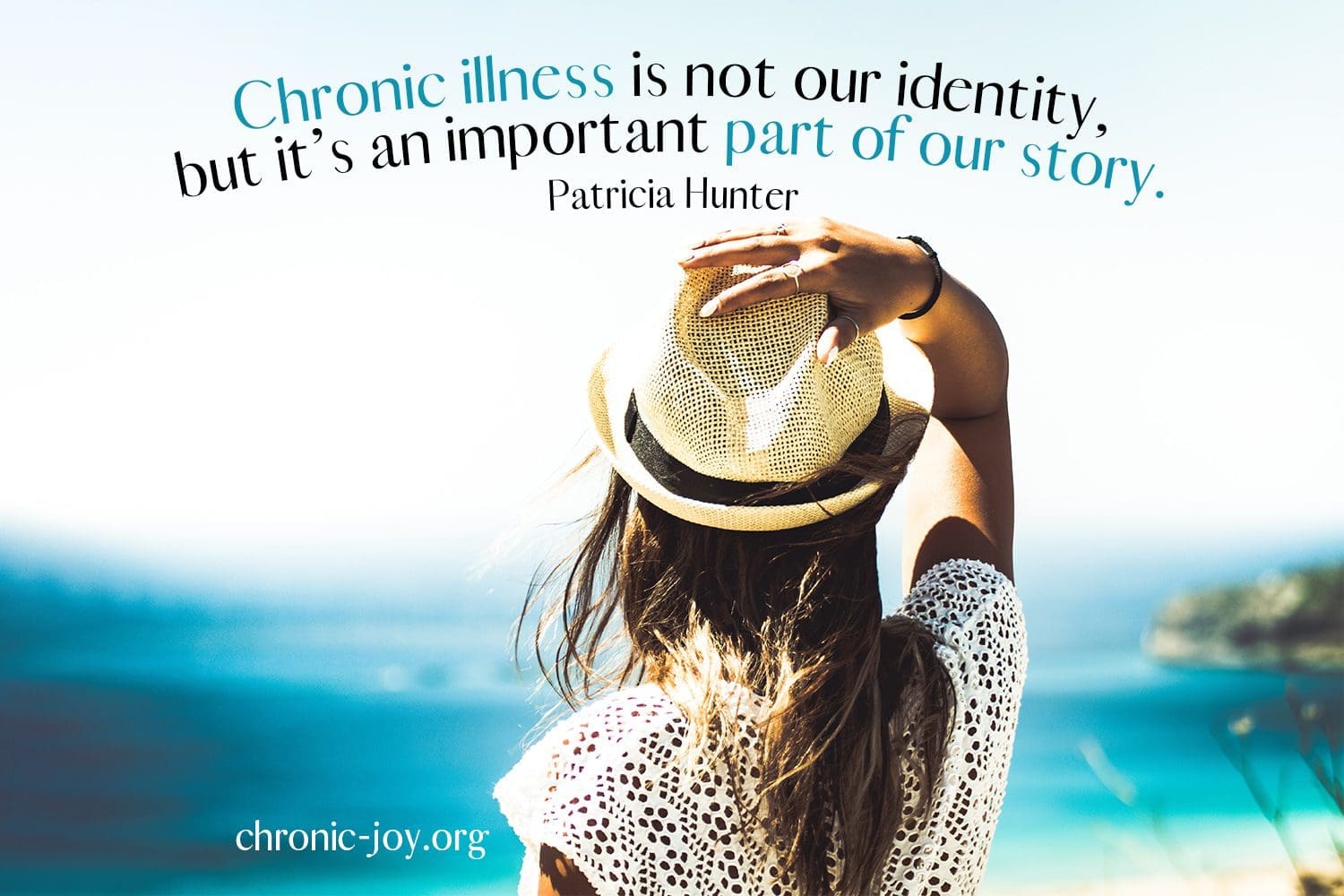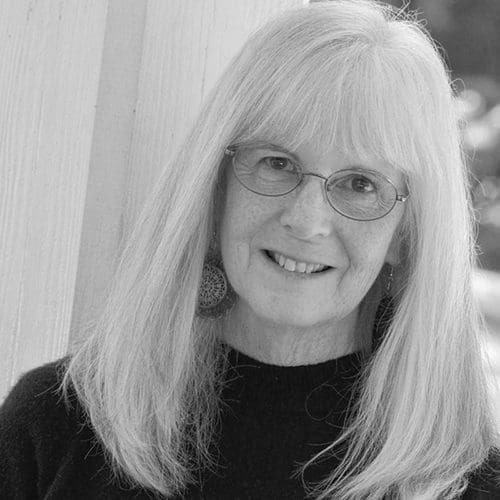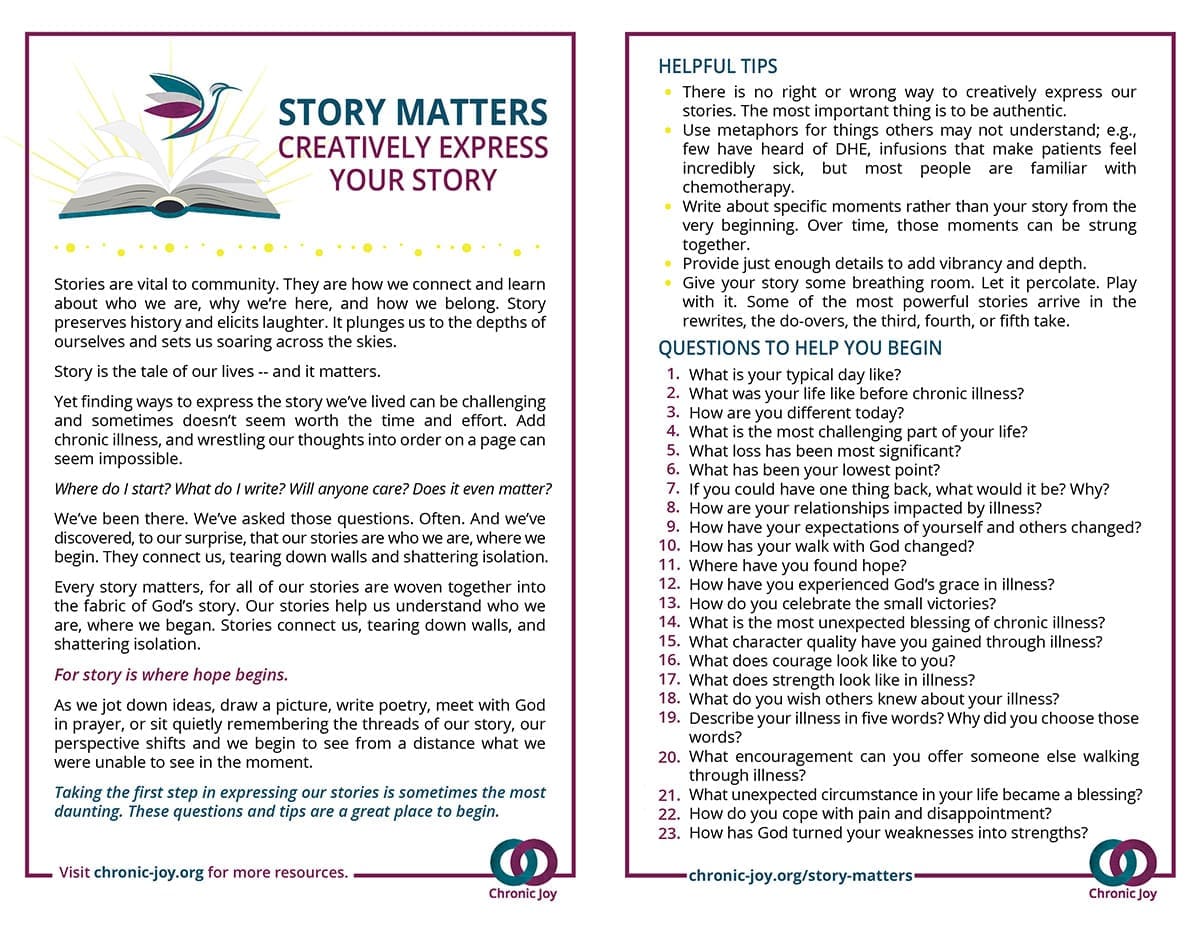
“Chronic illness is not our identity, but it’s an important part of our story.” Patricia Hunter
SHARING OUR STORIES
A few years ago I read Grace Stuart’s 1953 memoir, Private World of Pain. This book chronicled her life-long battle with rheumatoid arthritis (RA) before and after prednisone. Grace was fifty-two, had endured considerable physical pain and disability from RA for over thirty years before prednisone was discovered and available.
If decades of physical pain were not enough, Grace wrote of the emotional pain of chronic illness and disability. She wrote particularly of the pain of what she called “unkind attention” from others. For those whose words and actions were kind and compassionate, she said this: “It may possibly give them pleasure to know that they brought healing to the wounds they never caused.”
Almost thirty-five years ago I had emergency surgery for a perforated colon. That eventually led to a diagnosis of Crohn’s Disease – an autoimmune disease that affects the entire digestive track. I was fortunate that flares responded quickly to treatment. They were kept to a minimum following the removal of half my colon.
About a year after that surgery, I left my career in nursing to stay home with our growing family. I began homeschooling a few years later. With that, and eventually caring for my bedridden mother with RA and Parkinson’s dementia full time in our home, I was too busy to care for myself. The only doctor I saw regularly was a gastroenterologist.
UNKIND ATTENTION
Occasionally I’d see a family doctor who would refer me to a rheumatologist for the joint pains and other RA-related symptoms I was experiencing. Each time my symptoms would be dismissed. After years of wasting time and money with no results, I decided to stop seeing any doctor but my gastroenterologist.
Until the day I couldn’t get out of bed.
My hands, wrists, knees, and feet were so inflamed I could barely move. I had pneumonia, my blood pressure was high, and my blood work came back highly positive for RA. It usually takes months to get an appointment with a rheumatologist. Yet, the doctor arranged for me to be seen the next day.
Before RA, I’d already experienced a form of “unkind attention” when I told others about having Crohn’s Disease. So, I usually kept it to myself. It was discouraging to hear from well-meaning but ill-informed friends and acquaintances that I should have more faith. Some suggested I should become a vegan or take this or that supplement. Others said I should follow the advice of Doctor So-and-So, who they heard had discovered the cure for Crohn’s.
I could manage Crohn’s flares without telling anyone, but RA was different. The effects of RA were impossible to hide, and I only invited “unkind attention” by writing about it. Unsolicited advice and uninformed opinions on how to be cured or what I did to cause chronic illness were a common reaction. One of the most hurtful was that I needed to consider that autoimmune diseases are caused by unconfessed sin.
SHARING OUR STORIES – THE GOOD AND THE BAD
Like Grace Stuart, I’m grateful for those who “bring healing to the wounds they never cause” by not suggesting a treatment or cure they heard or read about. Instead, they want to know how they can help. They ask how I’m doing and look beyond their own ideas about health, wellness, and the medical and pharmaceutical community. They listen with compassion and to gain understanding.
I know that most people who think they know what will fix me or make me better do so because they care and want to see me well. Yet what they may think is compassion feels more like shame and discouragement. However, I’ve learned to respond with a smile and to say, “Thank you for sharing that with me.”
Though we continue to hold onto hope for a cure, most of us who have lived with chronic autoimmune diseases for a while have adjusted. We’ve learned how to manage pain on most days and to cope with an array of challenges. While recognizing our limitations, we enjoy a full, satisfying, joyful, and grateful life. All the while, we know that this world is not our forever home. As Joni Eareckson Tada wrote, “Suffering keeps swelling our feet, so earth’s shoes don’t fit.”
Chronic illness is not our identity, but it’s an important part of our story. We can encourage each other by sharing our stories. We share our good days and our bad days with those we trust in communities like this one and wherever the Lord leads us. It helps us to know we’re understood and brings healing to the wounds caused by well-meaning but ill-informed others.


Patricia Hunter
Patricia is a freelance writer and photographer She and her husband, Louis have 4 grown children, 8 grandchildren, and have been married for more than 40 years. It’s all grace. Patricia shares her words and photography at Pollywog Creek. Her beautiful gift book, No Matter What, It’s a Good Day When, brings encouragement, courage, and renewed hope for life’s journey…because some days are good and some not so much.

Story Matters
Creatively Express Your Story
We can feel isolated and powerless when living with chronic illness, but what if your story begins to bridge the gaps? What if your story offers a glimmer of hope to someone standing at the edge of hopelessness?

Recent Comments